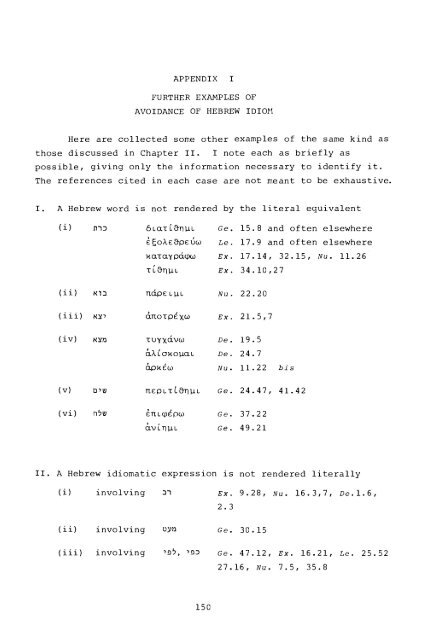A Lexical Study of the Septuagint Version of the Pentateuch
A Lexical Study of the Septuagint Version of the Pentateuch
A Lexical Study of the Septuagint Version of the Pentateuch
You also want an ePaper? Increase the reach of your titles
YUMPU automatically turns print PDFs into web optimized ePapers that Google loves.
FURTHER EXAMPLES OF<br />
AVOIDANCE OF HEBREW IDIOM<br />
Here are collected some o<strong>the</strong>r examples <strong>of</strong> <strong>the</strong> same kind as<br />
those discussed in Chapter II. I note each as briefly as<br />
possible, giving only <strong>the</strong> information necessary to identify it.<br />
The references cited in each case are not meant to be exhaustive.<br />
I. A Hebrew word is not rendered by <strong>the</strong> literal equivalent<br />
(i) Π13 διατ ίθημι Ge. 15. .8 and <strong>of</strong>ten elsewhere<br />
έξολεθρεύω Le. 17. ,9 and <strong>of</strong>ten elsewhere<br />
καταγράψω Ex. 17. .14, 32.15, Nu. 11.26<br />
τίθημι. Ex . 34. .10,27<br />
(ii) «τα τιάρε ι μ ι Nu . 22. . 20<br />
(iii) άποτρέχω Ex . 21. .5,7<br />
(iv) nun τυγχάνω De . 19. .5<br />
άλί σκομαι. De . 24. . 7<br />
άρκέω Nu . 11. .22 bis<br />
(v) O'KJ περιτί,θημι Ge . 24. ,47, 41.42<br />
(vi) nbv επιφέρω Ge . 37. .22<br />
άνίημι Ge . 49. .21<br />
II. A Hebrew idiomatic expression is not rendered literally<br />
(i) involving αϊ Ex. 9.28, Nu. 16.3,7, De.1.6,<br />
2.3<br />
(ϋ) involving Ge. 30.15<br />
(iii) involving 'ai?, Ge. 47.12, Ex. 16.21, Le. 25.52<br />
27.16, Jfu. 7.5, 35.8

















